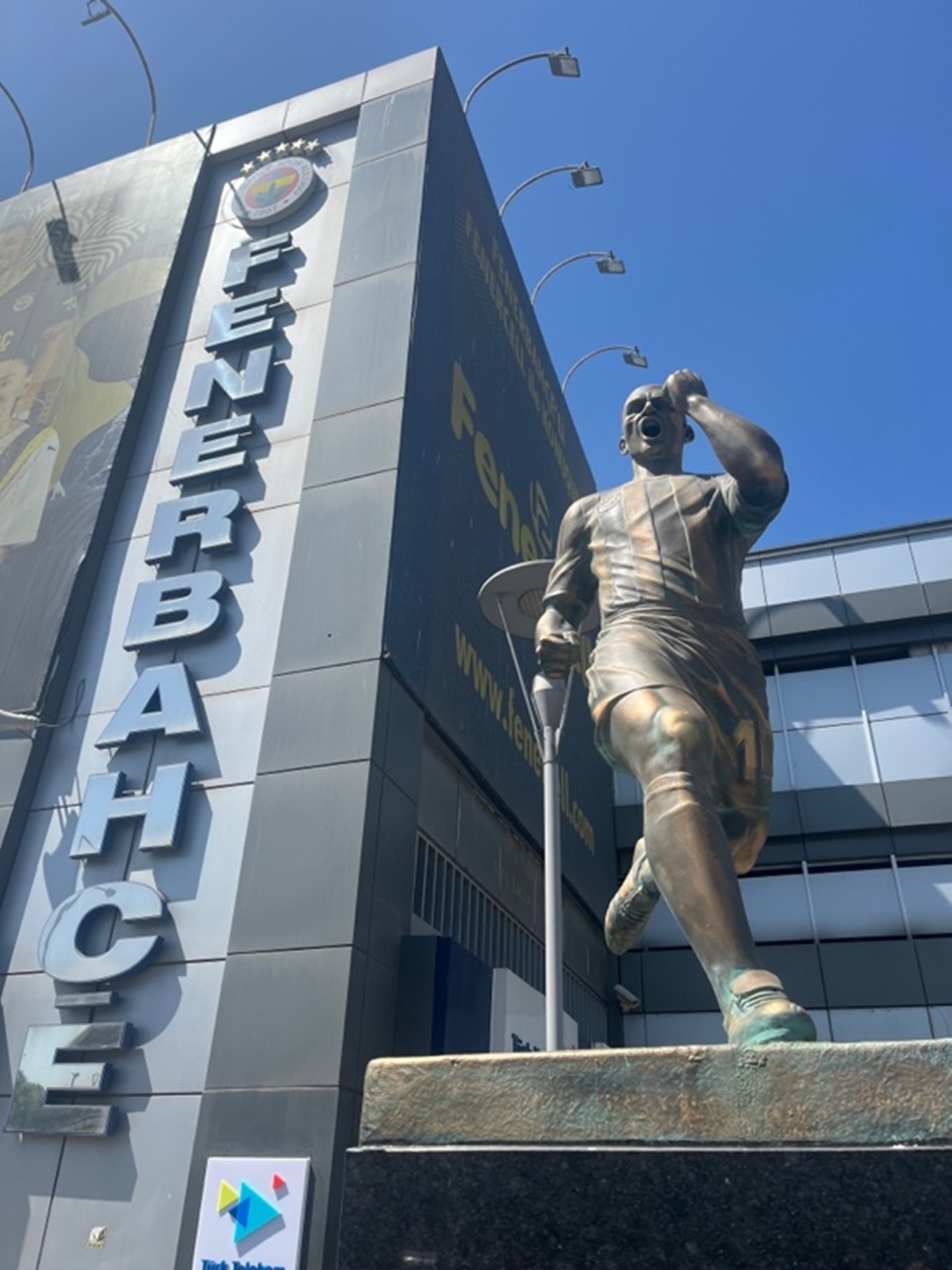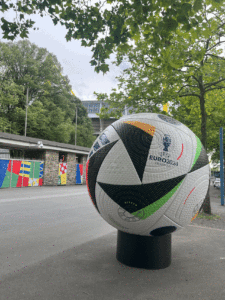This summer, one of the Robert H. Brooks Sports Science Institute’s newest faculty fellows, Felipe Tobar, Ph.D., traveled Europe to continue his long-term project of studying the transmission or suppression of difficult heritage in European soccer grounds. His findings at Real Madrid (Spain) and FC St. Pauli (Germany) will be included in an upcoming research documentary, “The Match That Not Every Club Wants to Play.” He also traveled to his home country, Brazil, to engage in other sport-related tourism and heritage activities.
Spain

To kick off his European research tour, Tobar traveled with the Clemson Women’s Soccer team to Spain for their study abroad trip. As part of their Parks, Recreation, and Tourism Management (PRTM) 3500 Global Challenges course about soccer, climate change and sustainability, the team visited four stadiums and three training centers for professional Spanish clubs, including Real Madrid, FC Barcelona, Valencia and Atletico Madrid. Tobar and the team watched official matches, toured backstage and even played official friendly matches with the clubs’ first and second teams. At each site, they analyzed and compared how the Spanish soccer clubs were engaged in the ‘green revolution.’
“The cultural and sporting experiences added to the opportunity to meet new people, including staff, students and the organizers. This is something that I will carry forward and soon share in my classroom with new students.”
Felipe Tobar, Ph.D. on his study abroad experience with the Clemson Women’s Soccer team
Germany

After leaving Spain, Tobar traveled to Germany and visited the cities of Frankfurt, Bremen and Hamburg. While there, Tobar engaged in activities related to his upcoming research documentary and a 2025 German study abroad program on football, culture of remembrance, and politics. Some of the incredible experiences Tobar had in Germany included touring Frankfurt and visiting Holocaust memorials and sites related to national socialism, touring the Weser Stadion using Google AI Translator, and checking the new museum exhibition of FC St Pauli on the discovery of a former Jewish player persecuted by the Nazi regime.
“The importance of coming back to Germany after three years since my dissertation data collection to record new footage for my documentary was essential. I confirmed my previous observations and reinforced networking links to bring undergraduate students to Germany next year on a study abroad program. The students will understand better how German society and its soccer clubs have been dealing with the Nazi past.”
Felipe Tobar, Ph.D. on his visit to Germany the summer of 2024
Turkey

The next stop on Tobar’s European excursion was Istanbul, Turkey for a few stadium tours and museum visits.
“Strolling through Istanbul streets and public buildings like the Grand Bazar, you can see a tradition that is part of the city’s cultural and sport heritage after every national championship.”
Felipe Tobar, Ph.D. on his experience in Istanbul, Turkey
He noticed that everywhere he looked, locals were displaying the flag of Galatasaray, the most successful Turkish club in European competitions and the current national champions. Tobar was able to speak with locals to better understand the reasons and history of such a tradition. He also had the opportunity to visit Galatasaray’s home and the clubs that wanted to dismantle Galatasaray’s hegemony.
Tobar’s research agenda on Istanbul’s main soccer clubs started at Fenerbahçe Stadium, where he toured the club museum and researched local fans’ memories linked to former club captain Alex de Souza, who is the only living individual to have a statue in front of the stadium funded and erected entirely by fans.
Tobar later visited Besiktas stadium and its museum observing how this club, alongside the other capital clubs, paid fervent homage to Mustafa Kemal Atatürk, founding father of the Republic of Turkey. Tobar plans to author another paper seeking to understand the approaches each of these clubs employ when linking their images with what is still considered the most important personality in the history of modern Turkey.

The statue of former captain and club legend, Alex de Souza, in front of Fenerbahçe Stadium in Istanbul, Turkey. 
In the façades of Besiktas stadium, the club features its Eagle mascot and a tribute to the 100 years of Turkey’s liberation from British control through images and phrases to honor Mustafa Kemal Atatürk.
UEFA EURO 2024

After Istanbul, Tobar traveled back to Germany for UEFA EURO 2024. Throughout the tournament, he traveled to several host cities to engage in two main lines of research: the ‘German Football Culture of Remembrance’, and how the UEFA (Union of European Football Associations) and its partners communicate sustainability efforts to football tourists and locals. Alongside his first line of research, the DFB Cultural Foundation (German Football Federation), in collaboration with the World Jewish Congress and What Matters, introduced the “Football and Remembrance” program aimed at addressing the history of national socialism. Various memorials, places of remembrance and museums across the nation, particularly near the ten host cities, participated in several special events.
Tobar was able to visit the following sites and talk to various experts:
- Munich – Dachau Concentration Camp Memorial Site – Football in the Dachau concentration camp | Tour
- Cologne – NS-Documentation Centre of the City of Cologne
- Hamburg – Foundation of Hamburg Memorials and Learning Centres Commemorating the Victims of Nazi Crimes – Stories of Persecution during National Socialism and the HSV | Tour
- Foundation of Hamburg Memorials and Learning Centres Commemorating the Victims of Nazi Crimes – Football in concentration camps | Tour
- Bergen-Belsen Memorial – Who against whom? Football under National Socialism | Workshop
- Büren-Wewelsburg – Memorial Museum Wewelsburg – More than just a game – football under National Socialism | Exhibition
- Football Under the Nazis’ “Sports. Crowds. Power.” | Exhibition
In addition to visiting these sites, Tobar also had the opportunity to visit the museums and representatives of Borussia Dortmund, Bayer Leverkusen, and Bayern Munich, as well as the German Football Museum and the German Olympic Museum. To learn more about his time in Dortmund, click here.
Tobar was also invited by the Red Against Racism initiative from Bayern Munich to visit the club’s headquarters and learn more about their project to tackle antisemitism and other discriminatory practices within German football stadiums and society. Still in Munich, Tobar visited a representative from the Kurt Landauer Foundation named after the former Jewish president, Bayern Munich, persecuted by the Nazis.
“Out of Germany, I intend to share these clubs’ experiences and ways of revisiting (or not) the past with different audiences and societies that often struggle to face their respective histories. Apart from making these stories more accessible as they will be written in English, the book can serve as a meaningful and powerful vehicle of reflection to other traumatic societies on how to come to terms with difficult pasts and potentially promote collective healing”.
Felipe Tobar, Ph.D., on the focus of his research in Germany

Strong messages were featured at Football Under the Nazis’ “Sports. Crowds. Power.” exhibition near Olympiastadion in Berlin reminding that ‘football is never neutral’ and that ‘people choose their actions’ during the Nazi regime. 
Tour guides from Hamburg, Germany’s HSV Fan Projekt sharing the stories of persecution during national socialism. 
UEFA EURO 2024’s sponsor, Chinese BYD’s electrical manufacturing company, stands at the UEFA EURO FAN FEST in Cologne.
Scotland

After Germany, Tobar traveled to Scotland for the Leisure Sciences Association Congress hosted by the University of West Scotland. At the conference, Tobar toured the Scottish National Football Museum and the national stadium, Hampden Park. He investigated the tour’s narrative and organization for future studies, and focused on understanding and cataloging how women’s football was depicted in the museum exhibitions. On the last day of his academic trip to Scotland, Tobar experienced the ‘Glasgow Football Tour’ which challenges the authorized heritage discourse from FIFA on who and when association football was invented, and who created the ‘passing game’ known today as ‘tik-taka,’ among other historical anecdotes.
Brazil
Before returning to Clemson, Tobar stopped in Brazil, his home country. Apart from following Grêmio Football Porto-Alegrense in two matches of the Brazilian Cup, in different cities and stadiums, as a sport tourist (just as he teaches in his ‘Sport Tourism and Events’ course in Clemson’s PRTM Department), Tobar visited the Brazilian National Football Museum located at the Pacaembu Stadium. This was once considered a historical landmark in the city of Sao Paulo. There, Tobar analyzed how the museum now remembers the image of the best soccer player of all time, Pelé, who was also responsible for popularizing the sport in the U.S. in the late 1970s. Tobar also dedicated special attention to the promotion and interpretation of women’s football within the museum displays, which will be incorporated in a future publication comparing how the three national football museums he visited during the summer – German, Scottish and Brazilian – promote women’s football.

Marta, the world’s most acclaimed women’s football player, is highly revered across the museum displays.
A match between Grêmio and Corinthians, Copa do Brasil, Aug. 7, 2024.
“Having the opportunity to spend a few weeks in Brazil and engage in sport-related tourism and heritage research activities at such a relevant museum has been extremely rewarding. Also, participating in football matches and living fans’ passion for the number one sport in the country was a much-needed nostalgic experience.”
Felipe Tobar, Ph.D., on his experiences in Brazil
Up Next
Tobar was recently awarded a seed grant by RHBSSI to study more effective and inclusive VR soccer experiences. His research is kicking off this fall semester and he is currently recruiting Clemson students to join a Creative Inquiry course. Students will develop real-world skills relevant to their major, likely from PRTM, Bioengineering, Math or Computer Science. Furthermore, they will be active in helping create the experimental protocols and survey tools, collecting data during research sessions and analyzing results for the project.
To enroll, select one of the following course options in iROAR:
- PRTM 3980, 002 (CRN 92089),
- PRTM 3981, 002 (CRN 92090)
- BIOE 4510 (Sec 051): CI-Sports Science EEG & VR

To learn more about Felipe Tobar’s research and European adventures, follow him on LinkedIn or contact him at ftobar@clemson.edu.
